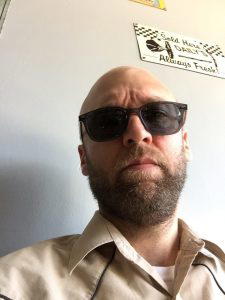Girls. That’s what Mr. O’Malley called us when he gave us the strawberry Seagram’s wine cooler, which meant he knew it was wrong, since we were sixteen and his students. Felt weird to call him Mister. He wasn’t that much older than we were. Twenty-two, with golden hair and a face tanned from being in the sun all summer, he’d just last year graduated from Dartmouth before joining the English faculty here at Brewster.
“Go on,” he said, “take one,” so we did. Me and Laura, our moms were faculty, too. That was how come we’d spent all summer in Wolfeboro, which Mom always said once the tourists left was a sleazy little town. Except after a few glasses of wine, when she put on Bonnie Raitt and started slurring while she chain-smoked and bitched about Dad, gone to Albuquerque with Wife Number Two, instead of sleazy, she said shitty.
Underneath us, Mr. O’Malley’s boat rocked, bumping its moorings. We’d heard stories about that boat, but no one asked questions.
“Thanks.” Laura held the bottle between her knees. She had on a Nirvana tee-shirt. She’d dyed her hair purple. Had a nose ring because she did everything first.
“Are we still supposed to call you Mister O’Malley?” I felt weird about being there, so I was giving him a hard time. Laura passed me the wine cooler and I took a sip. Yuck: tasted like Kool-Aid. Mr. O’Malley looked like a kid who hadn’t done his reading getting called on in class.
“Brandon.” He cleared his throat. He was big and hunky, like Anthony from the Red Hot Chili Peppers, a surfer boy, except Mr. O’Malley didn’t surf. He coached varsity sailing, which was funny because he’d once told us he couldn’t hardly swim. Earlier, when Mom was hitting the wine, she’d said he was young, dumb, and full of you-know-what: “Stay away from him, Vanessa.”
“Brandon,” I repeated.
“Brandon.” That look said he hoped I’d not ask any more annoying questions. “I told you in class call me by my name. I don’t believe in arbitrary hierarchal arrangements between teachers and students, yeah?”
He went topside, cast off, and started the outboard. A few minutes later, we were on Lake Winnipesaukee with the running lights shining on the waves. Alone in the prow, after he dropped anchor, I dipped my hand in the water, my lifejacket snug around my chest. The boom rattled, and I untied it from the stern.
When I went below, Mr. O’Malley—Brandon—and Laura were slow-dancing to that REM song, “Everybody Hurts.” Mr. O’Malley held Laura close, Laura in her blue bikini, her hand on Mr. O’Malley’s shoulder. When the song ended, Mr. O’Malley stopped the cassette.
“You girls are going to get me in trouble.” His voice was hoarse, and he scratched his chest. He looked nervous. I felt sorry for him.
“Oh my God,” I said, acting the part, a dumb girl, “you guys, something’s up there you have to see.”
They followed me onto the deck. Half a mile from shore, the lights in town burned against the hills, the granite mountains blotting out the stars. “He’s like a puppy,” Mom had said that night she met Mr. O’Malley at the faculty dinner. “But he’ll turn into a dog, just like your father. Once they get the smell in their noses, they can’t help themselves.”
“Look.” I pointed into the darkness over the rail. As Mr. O’Malley leaned forward, I pulled Laura out of the way. When I pushed the boom, it swung across the boat, smacked his trunks, and knocked him over the side.
“Girls, help.” He splashed, paddling toward the boat. Laura grabbed the life preserver, but I held her. I gave her an oar, and she understood. He was an animal, he’d never change, and this was our chance to get free. When Mr. O’Malley reached for the gunwale, she whacked his fingers.
I started the outboard. People called that boat the Shaggin’ Wagon. Nobody asked questions.
Well, nobody would ask questions about this, either.


